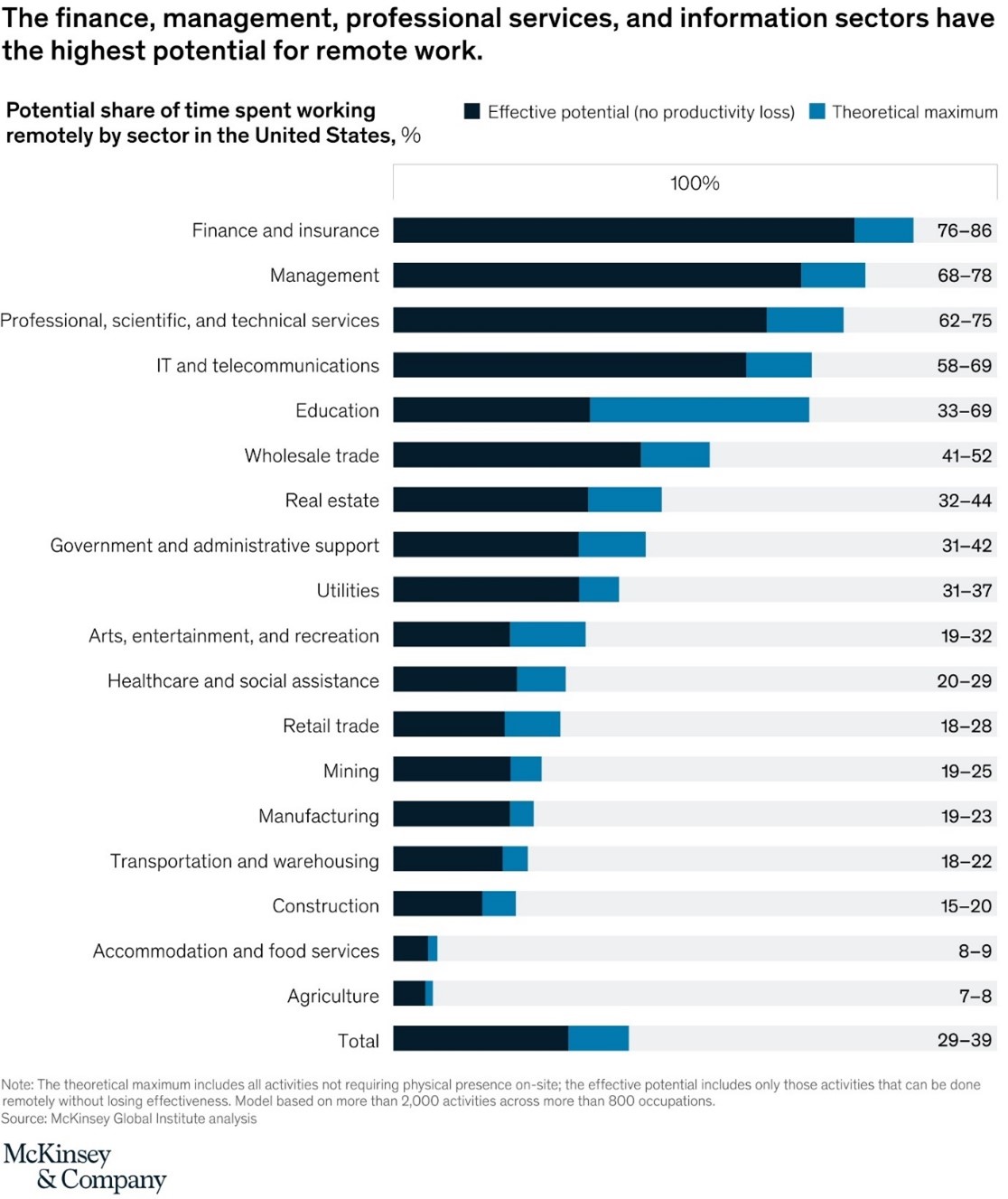
Global mobility after the pandemic
Best described as a “seismic” shift, the impact of the pandemic on organisations across the globe has been immense, changing the way in which employers view both the way and the where of work.
The magnitude of this unprecedented shift to remote work with many workers now interviewing and working globally from their living rooms, home offices and kitchen tables with family and pets joining in on Zoom calls has been discussed in both HR circles and the wider media as a positive outcome of the pandemic.
“Quarantines, lockdowns, and self-imposed isolation have pushed tens of millions around the world to work from home, accelerating a workplace experiment that had struggled to gain traction before COVID-19 hit.” (McKinsey)
A PWC survey of 350 companies in 37 countries to assess the impact of COVID-19 on global mobility found that 58% of companies surveyed were allowing employees to start new roles from their home country – “virtual global deployment”; a model of moving work to the people, rather than the people to the work.
According to the McKinsey study, remote work potential is concentrated in the sectors of finance and insurance, and management, business services, and information technology with more than half of employee time spent on activities that could effectively be done remotely.
The KPMG report states that “Global Mobility professionals are already talking about a longer-term increase in virtual assignments – either staying in the home-country while working for another “host” entity or working from a third-country altogether utilizing technology to perform the day-to-day role. The ease with which many people have been able to continue almost seamlessly in their current roles operating remotely has increased an understanding and awareness of the potential. These virtual assignments could also be balanced with the need to be physically present on occasion via extended business trips or even short-term assignments”.
These come alongside the adaptive challenge of cultural acclimatisation that must now happen digitally instead of face to face and a consideration of how to reduce any negative impacts on performance, development, retention and attraction.
There are personal implications here at play too – the idea of being stranded in a foreign country far from family and friends and or simply unable to travel in a relatively timely and unrestricted manner is now all too real to many internationally assigned employees, who may be rethinking the idea of physical re-location in preference for either a “remote” relocation or none at all.
For all the romantic hype about Work From Home (WFH) mobility in a global market, there are realities to be faced and issues to be addressed.
In a recent study by McKinsey of 2000 tasks, 800 jobs and nine countries, (China, France, Germany, India, Japan, Mexico, Spain, the United Kingdom, and the United States), the authors found
“the potential for remote work is highly concentrated among highly-skilled, highly educated workers in a handful of industries, occupations, and geographies”.
Jobs that cannot be done remotely include those involving the use of specialised machinery, face-to-face contact such According to the McKinsey study, remote work potential is concentrated in the sectors of finance and insurance, and management, business services, and information technology with more than half of employee time spent on activities that could effectively be done remotely such as medical imaging, providing aged care, operating machinery or using lab equipment, delivery and hospitality jobs.



According to the McKinsey study, remote work potential is concentrated in the sectors of finance and insurance, and management, business services, and information technology with more than half of employee time spent on activities that could effectively be done remotely.

From a larger economic perspective, the degree to which remote work will impact the productivity of a country is dependent on how much of a country’s economy is based on business and financial services – the UK for example has a workforce that could theoretically work remotely one-third of the time without a loss of productivity, according to the McKinsey study.
In emerging economies, where employment is skewed toward occupations that require physical and manual activities in sectors such as agriculture and manufacturing, the potential for time spent on remote work drops. In India, for instance, the workforce could spend just 12 percent of the time working remotely without losing effectiveness…(as)… the vast majority of its workforce of 464 million is employed in occupations like retail services and agriculture that cannot be done remotely.
On a global economic scale there are obviously constraints however in terms of those who are most inclined to relocate globally and who are able to also work remotely are those workers whose jobs require cognitive thinking and problem solving, managing and developing people, and data processing.
However, even in terms of these roles that can substantially be performed remotely, there are specialised tasks that support such roles which are traditionally better done in-person such as coaching and counselling, onboarding new staff, negotiating, and relationship building with customers and colleagues.
The optimal way to achieve these tasks remotely requires significant rethinking to get outcomes similar to those achieved in person and will be the next wave of development needs as we face a future where remote work may become more of a necessity than a luxury.
Scientists have been predicting a virus such as Covid 19 for decades – and were largely ignored. They are now saying this pandemic is only the beginning of similar and possibly worse outbreaks due to human impact on our natural environment. Global co-operation at unprecedented levels will be required to manage these without such loss of life and economic impacts – hopefully with learnings from the experiences of 2020 and 2021.
Whatever else may be in our future, people are hankering to get moving again and with vaccine rollouts enabling international travel again, we are likely, according to the HenleyGlobal report, to see millions of people scattering across the globe again in the coming months.
The trend for mobile migrants won’t be just in reaction to recent travel bans and lockdowns, however, according to Henley better economic opportunity, rising political tensions, climate change concerns and a wish for access to better healthcare are all drivers likely to impact on global migration over the next 12 months, and organisations, HR departments and governments of those countries will need to be ready with strategies in place to attract and retain the type of global migrants they need and want.
References:
https://home.kpmg/xx/en/home/insights/2020/08/flexibility-and-agiliity-post-covid-19.html
https://www.pwc.com/gx/en/services/tax/publications/covid-19-mean-for-global-mobility.html
https://www.henleyglobal.com/publications/global-mobility-report/2021-q2/global-mobility-today
The consultants at Bravo Careers work one-one-one with individuals and with organisations as a whole. Contact us to find out more about our comprehensive career and workplace services.